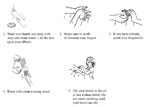Handwashing
How can you prevent infection by washing your hands?
Washing your hands is one of the most important things you can do to prevent infection. It prevents you from spreading germs to another person, and it helps protect you from germs, too.
If you can do nothing else to prevent infection, you must wash your hands (see Figure 3.9 and Box 3.3).

Box 3.3 Always do a 2-minute handwash
| Before you | After you |
|---|---|
|
Touch the mother's vagina |
Clean up after the birth |
|
Do a vaginal or pelvic examination |
Touch any blood or other body fluids |
|
Deliver the baby |
Urinate or pass stool |
Alcohol and glycerine hand cleaner
You can make a simple hand cleaner (rub) to use if you do not have water to wash your hands. When used correctly, this cleaner will kill most of the germs on your hands.
Mix 2 ml (millilitres) of glycerine with 100 ml of ethyl or isopropyl alcohol (strength 60% to 90%) or any alcohol used for skin cleaning before an injection.
To clean your hands, rub about 5 ml (1 teaspoon) of the hand cleaner into your hands, rub them together thoroughly and make sure to clean between your fingers and under your nails. Keep rubbing until your hands are dry. Do not rinse your hands or wipe them with a cloth.
Wash your hands with soap and water after every 5–10 uses of the hand cleaner solution to reduce the build-up of hand softeners.
Do not use a hand rub if your hands are contaminated with body fluids or are visibly dirty; instead wash your hands with soap and water.